-
San Francisco International Film Festival 2017
San Francisco International Film Festival 2017
General Film Forum thread
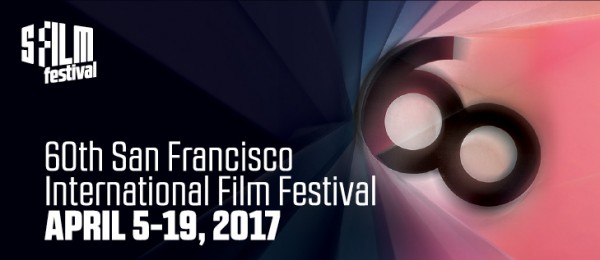
Links to the reviews:
Bending the Arc (Kief Davidson, Pedro Kos 2016)
Cinema Travelers, The (Shirley Abraham, Amit Madheshiya 2016)
Date for Mad Mary, A (Darren Thornton 2016)
Duet (Navid Danesh 2016)
El mar la mar (Joshua Bonnetta & J.P. Sniadecki 2017)
Family Life/Vida de Familia (Cristián Jiménez, Alicia Scherson 2016)
Heaven Sent/Tombé du ciel(Wissam Charaf 2016)
Invierno, El/The Winter (Emiliano Torres 2016)
Landline (Gillian Robespierre 2016) Opening Night Film
Long Excuse, The (Miwa Nishikawa 2016)
Lost City of Z, The (James Gray 2016)
Maliglutit/The Searchers (Zacharias Kunuk,Natar Ungalaak 2016)
Mukti Bhwan/Hotel Salvation (Shubhashish Bhutiani 2016)
Next Skin, The/La propera pell/La proxima piel (Isa Campo, Isaki Lacuesta 2016)
Ornithologist, The/O Ornitólogo (João Pedro Rodriguez 2016)
Park (Sofia Exarchou 2016)
Score: A Film Music Documentary (Matt Schrader 2016)
Sieranevada (Cristi Puiu 2016)
Student, The/(M)uchenik (Kirill Serebrennikov 2016)
Tania Libre (Lynn Hershman-Leeson 2016)
Transfiguration, The (Michael O'Shea 2016)
World Without End (No Reported Incidents) (Jem Cohen 2016)
As well as these SFIFF films previously reviewed on Filmleaf:
Beach Rats (Eliza Hittman 2016)
By the Time It Gets Dark (Anocha Suwichakornpong 2016)
Challenge, The (Yuri Ancarani 2016)
Death of Louis XIV, The/La mort de Louis XIV (Albert Sera 2016)
Endless Poetry/Poesía sin fin (Alejandro Jodorovsky 2016)
Future Perfect, The/El fuuro perfecto (Nele Wohlatz 2016)
Heal the Living/Réparer les vivants (Katell Quillévéré 2016)
Human Surge, The/El auge del humano (Edoardo Williams 2016)
Lady Macbeth (William Oldroyd 2016)
Life After Life/Zhi fan ye mao (Zhang Hanyi 2016)
Lost City of Z (James Gray 2016)
Nocturama (Bertrand Bonello 2016)
Paris Opera, The/L'Opéra (Jean-Stéphane Bron 2016)
Patty Cake$ (Geremy Jasper 2016)
Stopover, The/Voir du pays (Delphine, Muriel Coulin 2016)

Last edited by Chris Knipp; 07-25-2017 at 06:24 PM.
-
THE ORNITHOLOGIST/O ORNITÓLOGO (João Pedro Rodrigues 2016)
SFIFF 2017 - JOÃO PEDRO RODRIGUES: THE ORNITHOLOGIST/O ORNITÓLOGO (2016)
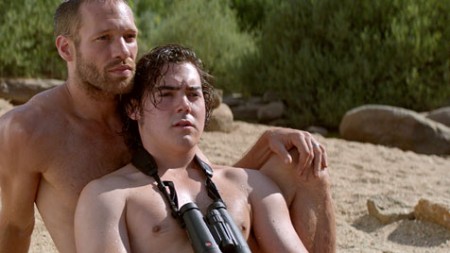
PAUL HAMY AND XELO CAGIAO IN THE ORNITHOLOGIST
Flying high
First of all The Ornithologist, though weird and unpredictable for sure, is more accessible than his previous features, less overtly and cloyingly gay - though it has its gay element (and ending): the protagonist unites with a hunky mute shepherd boy. They strip, bathe, have sex (not seen), then have a fight, in which the boy fares very badly, but he is later restored and they are seen hand in hand walking toward a pilgrimage spot on a busy modern street in the last shot. All of this film takes place outdoors, and its greatest pleasure is the flowing natural cinematography and the muscular, energetic action of Paul Hamy, the French lead (his lines voiced in Portuguese by the director, who replaces him briefly toward the end). Hamy, who was noticed as the quintessentially sexy and irresistible crook in Katell Quillévéré's tale of amour fou Suzanne, was heralded as the new French "bad guy." Here he is, ready to be tested and transformed into a sexy saint.
This is a visionary, far-out, sexily spiritual film. Best to know that it's (in Jay Weissberg's words in his Variety review) "a playfully queer riff on the St. Anthony of Padua legend." So the travails or adventures that happen to the protagonist are moving him toward spiritual enlightenment, sort of. He is called Fernando, but later, some bare breasted Latin-speaking Amazonian huntresses on horseback call him Antonio. Fernando initially is kayaking and bird-watching. Dp Rui Poças' flowing work includes back-and-forth between Fernando and black storks and other birds such that we get their point of view as well as Fernando's. Fernando's kayak gets caught in rapids, and he's washed up on shore semiconscious, rescued by two Chinese girls on their way to Compostela (but way lost). They save him, then tie him up and are going to castrate him next day, but he escapes. There's a martyrdom for you.
Fernando's encounter with wildly menacingly costumed tribesmen speaking the vanishing language of Mirandese makes this begin to seem not a nature adventure but a wild sequence of tales out of the 1001 Nights. The mute shepherd (Xelo Cagiao) turns out to be named Jesus, and then we can begin our religious interpretations for real. As Weissberg points out, St. Anthony's "reputation for dispelling demons, for preaching to fish, for holding the child Jesus, are re-imagined, while other Catholic stories are recalled, from Doubting Thomas to St. Anthony Abbot," and these provide intriguing points of reference, without really opening up clear meanings. Nonetheless of Rodriguez's films, this is the most fun, the most accessible, and maybe the craziest. But there is (some) method in its madness. It's also one of the best movies about birds you'll ever see. Here for the first time it's clear why the festival circuit has been celebrating João Pedro Rodriguez.
My previous reviews of Rodrigues films:
[url="http://chrisknipp.com/writing/viewtopic.php?f=1&t=618"]Two Drifters (2005)
To Die Like a Man (2009)
The Last Time I Saw Macao (2012)
His first feature was O Fantasma (2000).
Critics Roundup.
The Ornighologist/O Ornitólogo, 117 mins., debuted Locarno Aug. 2016; at least 14 other international festivals including Toronto, New York, Torino, Palm Springs, and Rotterdam. This is Rodrigues' fifth feature film. Screened for the San Francisco International Film Festival, schedule: : April 15, 2017 8:30 p.m. (BAMPFA); April 16, 2017 5:00 p.m. (SFMOMA).
It will be released by Strand starting June 23 (NYC) and June 30 (LA) 2017.
Last edited by Chris Knipp; 06-22-2017 at 09:07 AM.
-
FAMILY LIFE/VIDA DE FAMILIA Cristián Jiménez, Alicia Scherson 2016)
CRISTIÁN JIMÉNEZ, ALICIA SCHERSON: FAMILY LIFE/VIDA DE FAMILIA (2016)
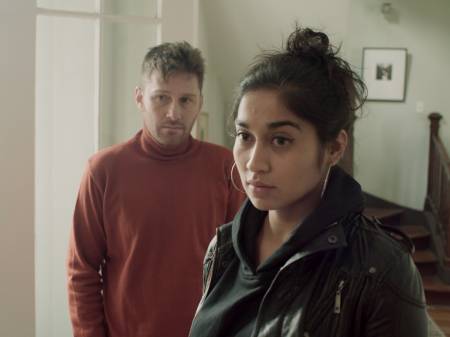
JORGE BECKER AND GABRIELA ARANCIBIA IN FAMILY LIFE
PREVIEW
Playing grownups
Here two leading Chilean directors, Scherson of Bonsái, team up for a small-scale tale based, as was Bonsái, on a story by Alejandro Zambra and adapted by him, and shot almost entirely in Scherson's roomy, pleasantly cluttered apartment, which becomes a key player, since it is the setting for "family life," the life of Bruno (Cristián Carvajal) and Consuelo (Blanca Lewin), a well-off thirty-something couple who live there normally with their little girl, and now for Martín (Jorge Becker), a distant cousin of Bruno's who comes to housesit for several months while they're off in Paris. Martín, of course, is only playing at "family life," but he soon has willing partners in this self-reflective fantasy about pretending to be grownup. This hasn't quite the whimsical magic of Scherson's earlier Play, but it transcends Jiménez's cute and witty but underwhelming Bonsái.
Family Life/Vida de Familla, 80 mins., debuted at Sundance Jan. 2017, also playing at Rotterdam and Miami. Nominated for top awards at Rotterdam and Sundance, it won the Knight Competition grand jury prize at Miami. Screened for this review as part of the San Francisco International Film Festival.
SCHEDULE AT SFIFF: April 12, 2017 8:45 p.m. BAMPFA; April 13, 2017 6:00 p.m. Roxie Theater; April 15, 2017 1:15 p.m. Alamo Drafthouse New Mission.
Last edited by Chris Knipp; 03-20-2017 at 12:17 AM.
-
SIERANEVADA (Cristi Puiu 2016)
CRISTI PUIU: SIERANEVADA (2016)
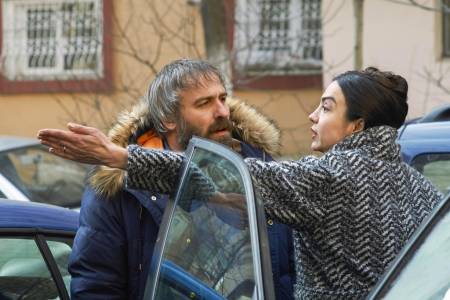
MIMI BRANESCU AND CATALINO MOGA IN SIERANEVADA
A family gathering
I reviewed Puiu's The Death of Mr. Lăzărescu at the 2005 NYFF, the first one I covered and the first film I saw there. I was entranced. Later I reviewed his Aurora at the 2010 NYFF. I found it strangely compelling, but quite lacking the moral outrage and black humor that made Mr. Lăzărescu so powerful. Sieranevada was in the 2016 NYFF, but I missed it then; I am reviewing it as part of the SFIFF, 5-19 April 2017. Sieranevada resembles the classic play, from Eugene O'Neill to Tennessee Williams to Tracy Letts, in which a family gathers and people squabble and spill the beans. But it violates the rules of such a play because it lacks discernible highs or lows and it never quite goes anywhere. It's more like the old movie Grand Hotel, "People come, people go. Nothing ever happens." That seems to be the point. Puiu captures the texture of the ordinariness of life. But he carries it to an extreme, it's very skillfully done, consistently well acted, but it goes from fascinating to numbing.
It's a kind of memorial dinner, like a wake, 40 days after the death of Emil, at his widow's cramped apartment, with a dozen family members, even a drunken young Croatian woman brought in by someone, and as time goes on a philandering husband who turns up unexpectedly and so upsets his wife she may have had a stroke. Puiu plays with our patience. He did that most effectively in his first, best, film, The Death of Mr.Lăzărescu, in which a very ill man dies in the course of a busy weekend shunted from one hospital to another. This time, the ritual at the flat of the widow, Nasu Mirica (Dana Dogaru), is that the priest must come and perform his service for the deceased before they can eat, and he is very late. Then attention shifts to Sebi (Marin Grigore), a young thin family member who's had a great deal to say about 9/11 and the Charlie Hebdo attacks, which have just happened, and he thinks connected - he's conspiracy theory nut and a truther. He must don one of Emil's suits and enter the dining room, asking forgiveness, as his spirit, before they can eat. And that is delayed too, because the suit is much too big for Sebi and has to be pinned. Then there is the unexpected appearance of Tony (Sorin Medeleni), the philanderer, causing a scene. Before that there have been many interludes, many ruffled feathers, notably between a royalist who weeps when an older woman rudely sings the praises of the communist days, describing Marx and Lenin as "kikes."
But in a way none of this matters: what Puiu is about is capturing the texture of life, the rhythm of family interactions for their own sake, and doing that in a special way, through a virtuosic flow and a quirky visual presentation. There are various rooms off the little entrance, with doors often being opened and shut, and a lot of the time the camera stays in the hallway, peeking into the rooms as people come and go and talk, so we see and hear some of the people but not all of them. And the camera oscillates back and forth between people giddily - so it's both stuck and highly mobile. It gives you the feeling of being half like a real participant, half like a voyeur, or perhaps the floating spirit of the dead man. And Puiu keeps the flow going, as Asghar Farhadi does in the early part of his recent The Salesman, and the Georgian directors Nana Ekvtimiishvili and Simon Groß do in their recent My Happy Family - skillfully wrangling a lot of people, here a dozen or so crisscrossing back and forth to kitchen, dining room, bathroom, in and out, giving the sense of a continuous take. That seems to be the point: the flow, the rhythm, the long trivial conversations, the fretting, the arguments that never end. This resembles another overlong recent Cannes film, Nuri Bilge Ceylan's Winter Sleep, except this is more claustrophobic, and not focused on one person.
Sieranevada (whose title, by the way, means nothing) sort of bookends itself with the eldest son, Lary (Mimi Branescu), a neurosurgeon, who now sells medical equipment, and his wife Laura (Catalina Moga), who come in a car: we arrive with them, and they have a big trivial row over a Disney outfit for their kid going in, and then near the end, back out in their car for a while (but still before food has been served) they have a kind of sharing and reconciliation, a confession from Lary about his father, the deceased. But the first few minutes, sitting looking at the car, is almost enough to make you want to walk out before the movie's even begun. After the first hour, though, I was enjoying the skillful flow and texture. It is masterful - and a change from the medical nightmare of Puiu's first film and the strangely deadpan murder story of his second, Aurora. This is a film about nothing, about life. But we have an hour and fifty-one minutes to go after that first hour, and it starts to wear you down.
The New Romanian Cinema is about many things, but sometimes it's about nothing, never more skillfully and completely than here: but also about everything, from the trivially personal to the politics of Romania and the state of the world. It's massively interesting but as drama never really satisfying.
Sieranevada, 173 mins., debuted at Cannes May 2016 for the first time in Competition (his first two films were in the Un Certain Regard category); showed in at least two dozen other international festivals including Toronto, London, and New York. It opened theatrically in France Aug. 2016 to very solid reviews (AlloCiné press rating 3.7; but spectator rating poor, 2.7). It got 3/5 stars from Peter Bradshaw of the Guardian and B- from Mike D'Angelo of AV Club Its Metacritic rating is 78%.
Last edited by Chris Knipp; 03-21-2017 at 02:19 AM.
-
THE STUDENT/(M)UCHENIK) (Kirill Serebrennikov 2016)
KIRILL SEREBRENNIKOV: THE STUDENT/(M)UCHENIK (2016)
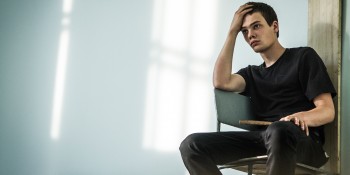
PYOTR SKVORTSOV IN THE STUDENT
PREVIEW
Bible thumper
Veniamin Yuzhin (Pyotr Skvortsov) is a pouty-faced pretty boy dressed in black, a trial to his working single mom (Yuliya Aug) and a provocateur in his high school armed with a well-thumbed Bible from which he quotes lines to advocate retro, repressive views. The film chronicles a series of his acts that amuse and disturb the school, lead to dire consequences for a "crippled" fellow classmate, Grigoriy (Aleksandr Gorchilin,) and drive his science teacher Elena Krasnova (Viktoriya Isakova) to distraction. As Yuzhin, Skvortsov makes one think of the young Leo DiCaprio, but without the same power to move. That's not entirely his fault because this re-adaptation of a German play Serebrennikov previously adapted to the stage reads chiefly as a series of sardonic stunts. It's great theater, but chilly filmmaking. The acting is lively, the sets, with the odd seaside ringed with what appear giant cement phalluses, and the luminous lighting, engage the senses. There are interpolations not in the play, notably the "cripple" Grigoriy condescendingly, abusively taken on by Yuzhin, a cloying, sentimental, pathetic character who shows off the multi-hyphenate director's manipulative hand. One gathers this is a comment on Russia's current decline and the invasion of backward institutions - but for that and more, the range and seriousness of Zvyagintsev's Leviathan remains unmatched.
The Student/(M)uchenik (original title: "martyr/student"), 118 mins., debuted at Cannes May 2016 in Un Certain Regard; at least 16 other festivals including the San Francisco International Film Festival, as part of which it was screened for this preview. Coming to theaters April 14.
Three SFIFF San Francisco showtimes and venues:
3:30 Apr. 6 Roxie; 5:30 Apr. 16 Yerba Buena Center for the Arts Screening room; 9 p.m. Apr. 18 Victoria Theater (2961 16th St).
Last edited by Chris Knipp; 06-18-2019 at 07:56 PM.
-
MALIGLUTIT/THE SEARCHERS Zacharias Kunuk, Natar Ungalaaq 2016)
ZACHARIAS KUNUK, NATAR UNGALAAQ: MALIGLUTIT/THE SEARCHERS (2016)
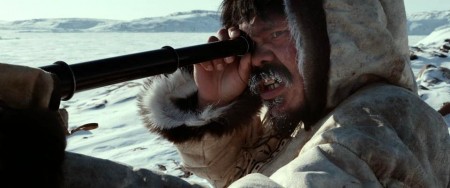
In 2001 I reviewed Kanuk's Atanarjurat: The Fast Runner and in 2006 at the NYFF I reviewed his and Norman Cohn's The Journals of Knud Rasmussen. (Cohn collaborated on the story for this new third film.) Representatives of Inuit filmmaking contacted me in 2006 and I was put in touch with ISUMA TV, a website where Inuit films are freely available. Go here for an ISUMA teaser of Maligulit.
Nunavut, circa 1913.* * Kuanana returns from a caribou hunt to discover his wife and
daughter kidnapped, and the rest of his family slaughtered.**His father's spirit helper, the
loon Kallulik, sets him on course to overturn fate and reunite his family.
Inspired by the John Ford film The Searchers, this new, equally atmospheric if somewhat less successful film 15 years since Kanuk's famous debut was inspired by his early memories of watching 16 mm. reels of John Wayne and other Westerns at the community center in his impoverished Inuit town. In this version, no Indians have wronged white people as in Ford's The Searchers. Instead, bad Inuit have wronged decent ones, robbing their two women and leaving a little boy murdered, and a father and son set off across the cold wasteland on dogsleds instead of horseback to get back the women and carry out revenge, protected by the guardian spirit of the loon, Kallulik.
Subtitle-writers seem overzealous in salting up their translations with F-words these days, but this new film is clearly notable early on for nasty language. In a confusing opening scene (the Atanarjurat mystifies in its opening too, also followed by a scene of terrible violence) men are cursed in the strongest of terms for disrespect and sex with their women and driven out.
They must be angry.
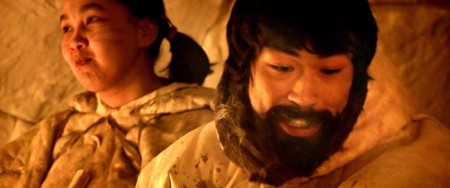
Next, we see an evening preparation for a hunting party, a peaceful, happy scene of eating and talking to animal spirits. In the daytime, a young father and grown son go out hunting, leaving an old man, two women, and a boy (who begs to be taken along). Later, following some scenes of daily routine, there is a horrific episode of violence, invasion and kidnapping that feels all the worse for coming at night just when the old man and the women have undressed and bedded down peacefully for the night. It's hard to imagine a more helpless scene. There are rough noises,the ingloo begins to crack from outside, and the adults get up in terror to defend themselves, thinking it's a polar bear. But, even worse, it is human marauders come to pillage and destroy.
The hunt and fighting in the last part is meandering and again, from the outsider's viewpoint at least, seems somewhat chaotic. Use is made of rocks and blocks of ice to hide. The hunters have their telescope but have only a couple of bullets for their worn out rifle, so they must use it well. A lot of time is given over to one kidnapper tying up his stolen wife and struggling with her at various stages of the action.
The scenes of the outdoors in the cinematography of dp Jonathan Frantz have a breathtaking beauty that makes this a film to watch on the largest of screens - though we yet remember the filmmaker's earliest movie thrills were on a little 16 mm. screen. In shooting fights, Kanuk switches from up close to far away, providing a sense of remoteness. A greater variety of sounds and music is used this time in the eclectic score by Tanya Tagaq and Chris Crilly. As before in Kunuk's films, a certain crudity, the inexperience of the non-actor cast, is compensated for by the intensity of the settings , the intense ethnographic flavor. This time I was particularly struck by the spectacular old fashioned fur garments. They are beautifully made: I hope they are as warm as they look. Traditional Inuit life in its snow swept far north world feels awesomely stark and challenging - and yet also paradoxically cozy and intimate, and even sexy. There's an implication that some of the women slept around. And that was how all the trouble started.
Maliglutit/The Searchers , in the Inuktitut language, 94 mins., debuted at Toronto Sept. 2016, playing also at Palm Springs, Portland, Kingston, and San Francisco; screened at San Francisco. 14 April 2017.
Showtimes in the SFIFF will be Apr. 14 at 8:30pm at Yerba Buena Center for the Arts Screening Room; Apr. 16 at1:30 pm at Berkeley Art Museum Pacific Film Archive; Apr. 18 at 1 pm at Victoria Theater, San Francisco.

Last edited by Chris Knipp; 03-23-2017 at 12:31 AM.
 Posting Permissions
Posting Permissions
- You may not post new threads
- You may not post replies
- You may not post attachments
- You may not edit your posts
-
Forum Rules






 Reply With Quote
Reply With Quote







Bookmarks